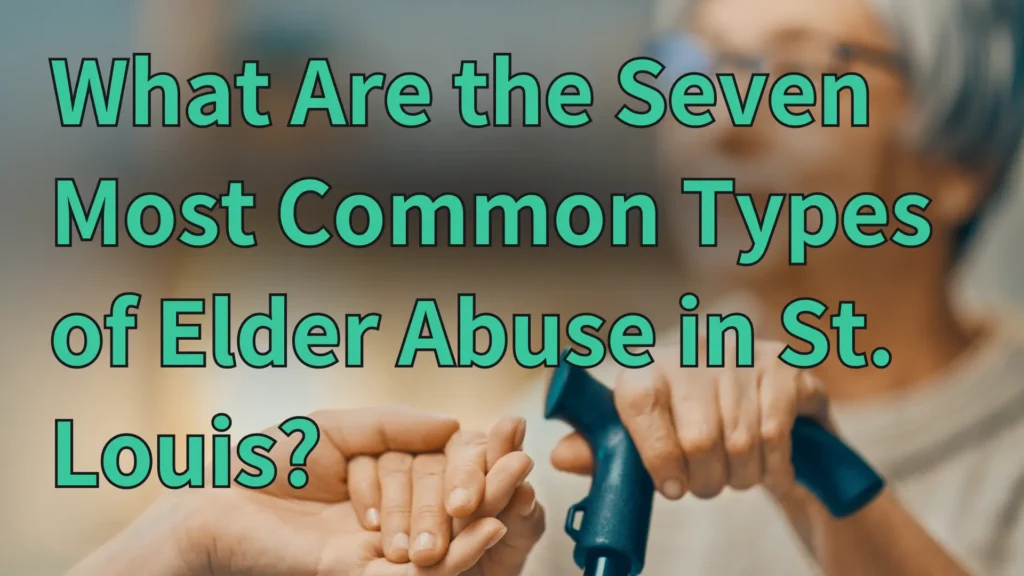
Elder abuse is a pressing issue that affects many seniors in St. Louis and beyond. According to the Department of Justice (DOJ), older adults are especially vulnerable to violent crime, neglect, and exploitation, including financial fraud. The National Council on Aging (NCOA) reports that social isolation and mental impairment make older adults particularly susceptible to abuse.
Knowing the different forms elder abuse can take is vital to protecting seniors. This abuse can occur in residential living facilities or private homes. According to the Centers for Disease Control (CDC), abuse is experienced by about 1 in 10 older adults who still live in their own homes. The abuser could be a caretaker or a complete stranger.
Understanding the types of elder abuse that occur can help loved ones spot it when it is happening. If your loved one is the victim of elder abuse, first, get them to safety. Then, engage the services of an attorney like the compassionate and skilled St. Louis nursing home abuse attorneys at Goldblatt + Singer to assist you in holding the responsible parties accountable.
Elder abuse comes in different shapes. The 7 types of elder abuse are Physical abuse, emotional abuse, sexual abuse, financial exploitation, neglect, abandonment, and self-neglect.
Physical abuse is any intentional act that results in physical harm to a person. This can include hitting, shoving, slapping, shaking, or improper use of restraints. Authorities might need reports of unexplained bruises, fractures, or welts on older adults who have suffered physical abuse. Observing these signs and reporting them ensures the well-being of your elderly loved one and other seniors.
Emotional abuse occurs when a caregiver or other person causes emotional pain or stress to an elderly resident. This abuse can take the form of verbal assaults, threats, harassment, or isolation from friends and family. Friends and family often already isolate elderly individuals, so spotting the signs of this type of abuse can be hard. Signs of emotional abuse can be subtle but may include the loved one becoming withdrawn, fearful, or depressed. They may avoid difficult conversations with loved ones and retreat into themselves. Loved ones should take notice of any changes in their elderly loved one’s behavior.
Sexual abuse involves non-consensual sexual contact of any kind with an elderly person. It can range from unwanted touching to rape. Many seniors are unable to give consent because of cognitive disabilities. As such, seniors are much less likely than other members of the population to report sexual abuse. Physical signs of sexual abuse may include bruising, unexplained sexually transmitted infections, torn underwear, or fearful behavior around particular caregivers.
Missouri law defines financial exploitation of an elderly person as the illegal or improper use of an elder’s funds, property, or assets. Financial exploitation is a common form of elder abuse. Family members or caretakers, as well as others using technological means, increasingly perpetrate financial abuse against elderly individuals.
Forging documents, stealing money, or forcing the senior to create wills or contracts that make the abuser the beneficiary can accomplish financial abuse. Elderly individuals who are victims of financial exploitation might suddenly have insufficient funds to pay for necessities, or there may be significant changes in their financial situation without a clear explanation.
Neglect happens when a caregiver fails to provide the necessary care to meet the older person’s needs. The caretaker can fail to provide food, water, or medication. Failing to ensure the senior receives appropriate hygiene is also neglect. Neglect can be intentional or unintentional. Many caregivers, overwhelmed by the responsibilities of caring for an elderly individual, may unintentionally fail to meet their needs. Nonetheless, the result remains the same: it compromises the elderly’s health and well-being. Malnutrition, dehydration, poor personal hygiene, or untreated medical conditions are all signs of neglect. Regular check-ins help ensure that elders are receiving the care they need.
Abandonment occurs when a caretaker completely deserts the elderly victim. The victim could be left alone in a public place or simply abandoned in their homes. The signs of abandonment are like neglect, but the key difference is that the caretaker completely leaves the elderly person alone. Some elders need around-the-clock support and care.
Self-neglect happens when an older person refuses or fails to care for themselves adequately. Family members and caregivers should be vigilant in observing these signs and provide the necessary support to address self-neglect. Older adults may not be willing to admit that they need additional assistance. Regular visits and check-ins can alert loved ones to potential risks.

Understanding the different types of elder abuse is the first step in protecting our seniors. It is essential to look for signs of abuse on the elderly.
If you suspect elder abuse, report it to the appropriate authorities. You can contact local law enforcement or the Missouri Department of Health in St. Louis. Taking action can protect seniors and ensure they receive the care and respect they deserve.
Preventing elder abuse involves awareness, education, and proactive measures. Be a safe space for your elderly loved ones and pay attention to their well-being.
Elder abuse is a serious issue that requires vigilance and action from everyone in the community. We can protect our elderly population and ensure seniors live with dignity and respect if we know the signs of elder abuse. If you suspect that an older adult is being abused in St. Louis, take immediate action to report it and seek help. Contact authorities if necessary.
You may also need legal assistance to get the financial justice your loved one deserves. The lawyers at Goldblatt + Singer are experienced with these types of cases and can help you if you believe your loved one has an elder abuse claim. Call our law firm at (314) 231-4100 or contact us online for assistance.